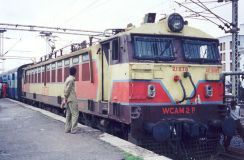Kenya-Sudan rail project enjoys top political backing
Dec 3, 2005 (NAIROBI) — After months of feasibility studies, Kenyan authorities have concluded that a Kenya-Sudan rail project, estimated to cost 25 billion US dollars would be handled as a regional project to boost trade ties in the eastern African region.

“We have decided that the rail project would benefit all the countries in the region and we decided to handle it as a region and not as individual countries,” Kinyua said in an interview.
Kenyan President Mwai Kibaki reinforced the planned construction of the railway in his national address to the nation mid this year. Kibaki said the government supported the construction of the Sudan railway and urged investors to support the initiative.
A group of German investors have been surveying the project and reviewing ways in which their firms could cooperate in the proposed railway project linking the Kenyan port of Mombasa and Juba city in southern Sudan.
The German interest in the project draws its strength from a combination comprising top corporate entrepreneurs with investment interests in diverse areas, key government officials and a member of the German Royalty.
Kenyan ministers, most of who were serving in President Kibaki’s cabinet before it was dissolved following a defeat in a national referendum on a new constitution, influenced the German government’s interest in the Sudan rail project.
Andreas Wolf, secretary of state and key figure in the German Ministry of Economy in the State of Brandenburg during Gerhard Schroeder administration, led a group of top executives that included Klaus Thormalen of the Thormalen and Ingeno Group of Companies that did feasibility study on the railway project.
Also on the delegation was M. Selbach, a top executive of the Thyssan-Krupp, one of the largest steel companies in Germany, which hoped to partner with Thormalen Corporation in the construction of the railway.
Thormalen hopes to bring a radical phase to the rail transport in the region by constructing one of the most modern railways on the African continent to revolutionize rail transport.
The Lunatic Express, running from the Kenyan coastal city of Mombasa to Kampala, is currently the longest in the region but is largely ineffective because of its age and gauge.
Sheltam Close of South Africa, the firm which won the 25-year concession to run the rail on behalf of the Kenyan and Ugandan governments, also confirmed that they would be willing to partner in the Kenya-Sudan rail project.
The Kenya-Sudan rail project came as a result of high-level Kenyan delegations to Germany that included then Planning Ministers Anyang Nyong’o, Roads and Public Works Raila Odinga and Trade Mukhisa Kituyi in April 2004.
Kenyan officials brought in Sudanese officials to the investment marketing delegation to Germany to seek investors for the larger Eastern Africa region as a complement for the Sudanese government’s desire to bring lasting peace and unlock economic growth.
The German government, which approved the 2,500-km rail link, dispatched State Secretary Dr Andreas Wolf at the head of a delegation of German investors to inspect the project, according to former Kenyan Planning and National Development Minister.
He said the project has attracted Thyssan-Krupp, which has invested in Southern Sudan and undertakes mining of gold, copper and diamonds in the region.
The company with an annual turnover of 24 billion euro will provide the rails while Pflerder, a concrete manufacturing company will provide concrete sleepers for the rail project.
The construction of the railway will constitute the first-ever stable link between Sudan and its neighbors and ease the delivery of essential services in the vast region.
The rail network, estimated to cost about 5 billion US dollars will link Kenya, Sudan and Uganda, and would enable Sudan to export oil from the south through a pipeline via Port Sudan to Mombasa, where it can be transported to Rwanda, the Democratic Republic of the Congo, Uganda and Tanzania.
Meanwhile, the semi-autonomous Southern Sudan People’s Liberation Army/Movement (SPLA/M) negotiated for the release of three billion euros from Germany to finance the rail project linking Sudan with Uganda and Kenya.
The financing deal was reached after negotiations spearheaded senior official of the organization in Germany three months before the January 9 peace accord ending decades of war was reached in Kenya.
Castello Garang Ring, SPLA/M Commissioner for International Co-operation and Development said one billion euros would be released for the first phase of the project, and two billion for the second phase.
The money would be used to finance the first two crucial phases of the 5,000-km railway network, which links Uganda’s town of Guluand Rongai in Kenya and Southern Sudan.
Garang, who was called by the three-top-level Kenyan delegation to Germany for talks to attract investors into Eastern Africa, said in an interview recently that the loan would be disbursed once the Sudanese parties sign a comprehensive peace deal.
He said the German multinational Thormalen Group is to handle the project, whose overall cost is put at 18 billion euros.
Kenyan officials say the construction of railway represents an economic opportunity for expanding trade between Kenya and Sudan which was referred to as a “sleeping giant,” ready to take up its seat among the economic giants of Africa.
The German Construction firm, Thormaehlen Schweisstechnik signed a contract with the Kenyan government, the SPLA/M and the Ugandan government to commence the project in September, 2004.
But the project is yet to begin and officials say construction work could depend on the speed at which the New Partnership for Africa’s Development (NEPAD) gets its acts together to begin promotion of ambitious rail, oil pipeline and road projects in the region.
“Topographical survey between Kitale (Western Kenya) and Southern Sudan region has been done. The study of the terrain has confirmed the viability of the project,” Nyong’o affirmed when reached for comment on the progress of the project.
(Xinhua)
